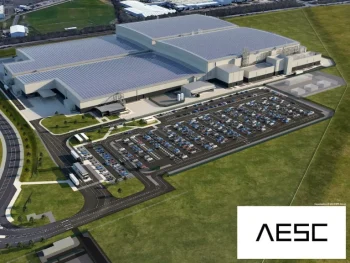£1bn secured for new Sunderland gigafactory in government-backed deal
AESC, Nissan’s EV battery partner, has secured a £1bn investment package for its new gigafactory in Sunderland with the help of a government-backed deal.

The site will be AESC’s second battery plant in Sunderland
The National Wealth Fund (NWF) and UK Export Finance (UKEF) have issued financial guarantees, unlocking £680m in financing from a group of commercial banks which includes Standard Chartered, HSBC, SMBC Bank International Plc, Societe Generale and BBVA.
The guarantees are key to the delivery of a wider project financing package worth more than £1bn.
AESC started work on the gigafactory in 2022. Located at the International Advanced Manufacturing Park (IAMP) in Washington, the site will be its second battery plant in Sunderland and will join the existing 1.8GWh facility that was built in 2012 and provided batteries for the Nissan Leaf.
When complete, AESC Plant 2 will have an initial capacity aimed to power up to 100,000 electric vehicles each year – including Nissan’s new third-generation Leaf. The plant will employ more than 1,000 people.
The UK government has identified gigafactories as a core sector for NWF investment. As a proven supplier of EV batteries in over one million vehicles and production capacity across three continents, AESC will support the UK in establishing a globally competitive domestic battery supply chain and in achieving net zero by 2050.
The NWF’s financial guarantee follows and replaces an initial £200m short-term bridging loan to AESC announced in January 2024, prior to the UK Infrastructure Bank transitioning into the National Wealth Fund.
The investment has been greeted by the Energy & Climate Intelligence Unit (ECIU).
Colin Walker, head of transport, said: “This is exactly the type of investment that is needed if the UK’s car industry’s future is to be secured. 80% of the cars built in Britain are exported, and global sales of EVs are only going in one direction – up. The future of our car industry depends on successfully moving with this trend, with the Government supporting the car industry in carving out a space for itself in the decades ahead by making a rapid transition to building the electric cars of the future.”
A recent report by CBI Economics, commissioned by the ECIU, revealed that a failure by the car industry to make the transition to manufacturing EVs could see its contributions to the UK economy fall by as much as 73%, or £34.1bn, and over 400,000 jobs could be lost.
Conversely, economic output could increase by over £16bn, and 167,000 new jobs could be created, if a rapid and successful transition takes place.
The ECIU says government support is critical if this best case scenario is to be secured, and the worst case scenario avoided. Such support includes the provision of incentives and investments to leverage private capital and expand supply chains, as well as providing a stable and supportive regulatory environment through keeping measures such as the ZEV mandate in place.
Walker elaborated: “Analysis from CBI Economics has shown that by slowing the transition to EVs, clinging to old technologies, the UK risks repeating the mistakes of the 70s and 80s, leading to a rusting car industry, billions in export revenue foregone, factories closing and hundreds of thousands of jobs being lost. Go fast, and our car industry will not only survive, it will thrive, with earnings increasing and thousands of new, highly skilled and well-paid jobs being created.”
AESCGigafactoryNissan Sunderland














Leave a comment